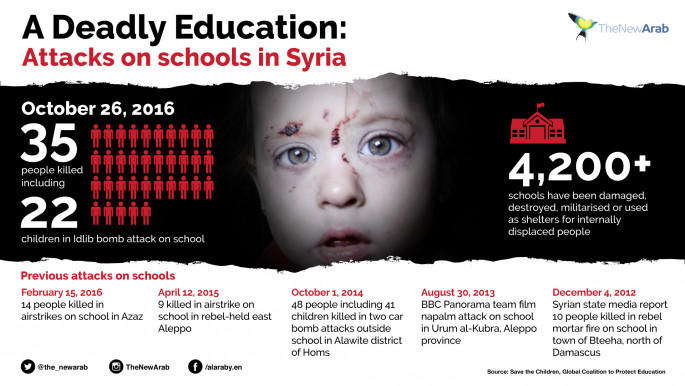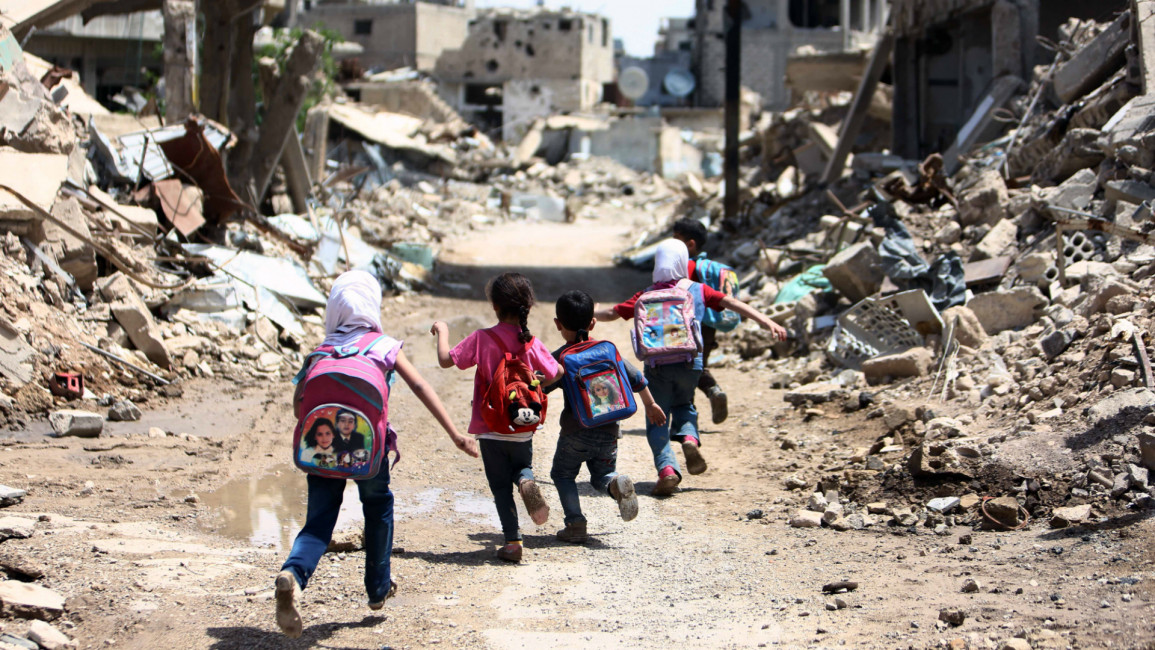Evidence 'corroborates' Russian role in devastating Syria school massacre
On October 26, 35 people, including 22 children, were killed in attacks on a school complex in the rural town of al-Hass in a rebel-held area of Idilb province in northwestern Syria.
In the immediate aftermath Russia, citing drone footage presented by the country’s Ministry of Defence, claimed that no airstrikes had taken place in al-Hass.
Multiple sources of evidence
However, in a report released on Wednesday, Human Rights Watch (HRW) stated that satellite imagery pointed to Russian and Syrian regime culpability, while drone footage released by the Russian Ministry of Defence – intended to support its claim that no airstrikes had taken place – showed damage consistent with HRW’s compiled evidence.
“The Russian government’s latest denials fly in the face of corroborated witness statements, videos, satellite imagery, and even its own drone footage,” said Bill Van Esveld, senior children’s rights researcher at Human Rights Watch in the report released on Wednesday.
“This denial is an insult to the victims and a symptom of the impunity and manipulation of information that has characterised the Syria conflict.”
In addition to analysing satellite imagery, HRW has also compiled video-evidence of the attack from at least two different sources, and the testimonies of at least seven witnesses of the attack.
Witnesses note that a total of five airstrikes took place on the school complex which consisted of an elementary school, two middle schools, and a secondary school; while video evidence appeared to show a Su-24 aircraft – only the Russian and Syrian militaries conduct airstrikes in Syria use this type of aircraft -- flying at medium altitude in the area at the time of the attack.
Additionally, noted HRW, bombs deployed appear to have been detonated before reaching the ground in order to “maximise the damage created by the blast effect of the weapon” helping to explain the lack of blast craters at the site of the attack.
Translation:Footage of the bombing of Hass munipality in Idlib's southern countryside [A video of 26 October attack in al-Hass filmed by the Kafranbel Media Centre]
'Compelling evidence' of international law violations
In a letter to Russia’s Ministry of Defence on Wednesday HRW called on Moscow to carry out a thorough and transparent investigation into the attack.
Speaking to The New Arab, Lama Fakih, HRW’s Middle East & North Africa Deputy Director, said that HRW had decided to write directly to the Russian Ministry of Defence after Moscow initially disputed the international watchdog's claims that airstrikes had taken place in al-Hass.
Russian military figures also notably denied that airstrikes were responsible for a deadly attack targeting an aid convoy in the Aleppo suburb of Orum al-Kubra on September 19, with one military spokesman at the time claiming that the destruction had been caused by a “fire”. The Syrian regime and Russia were later implicated in that attack.
“The aim of the letter was partly to respond to the Russian government’s allegations. We believe we have compelling evidence of violations of international law. Unfortunately official Russian statements on events in Syria do not reflect the severity of realities on the ground,” said Fakih.
Speaking to The New Arab earlier this month, Misty Buswell, Save The Children’s Communications Director for the Middle East and Eurasia, noted that combatant forces in Syria have acted with almost complete “impunity”in Syria. Fakih concurred.
Over the course of Syria’s now nearly six year-long war, more than 4,200 schools in the country have been damaged, destroyed, militarised and used as detention centres, or been converted into shelters for internally displaced persons, according to UNICEF.
Since deadly events in al-Hass at least two further attacks – one carried out by pro-regime forces, and one by rebel groups– are reported to have taken place in Syria.
Monitoring groups hold the Syrian regime of Bashar al-Assad responsible for the vast majority of attacks targeting civilian infrastructures in the country. In particular, Fakih pointed to the current situation in rebel-held East Aleppo, currently facing a joint Russian-and Syria siege, as evidence of such realities.
“Attacks targeting civilian infrastructures have contributed to massive flows of displacement, and in East Aleppo (the Syrian regime) is really trying to drive out entire civilian populations,” said Fakih who noted with frustration that proposals presented in the UN Security Council to persecute those deemed responsible for such attacks in international courts of law had been repeatedly vetoed by Russia and China.
As a result, Fakih noted, some efforts are underway to establish a campaign for the establishment of culpability for war crimes committed in Syria through the UN General Assembly.
Recently a number of individual cases accusing the Syrian regime of war crimes have also been accepted by national courts in Europe, notably in France, and also in the United States.
“Evidence collection and preservation will be crucial in any future cases,” noted Fakih, “in order to hold those guilty accountable.”
| |
| Watch: The aftermath of the al-Hass school bombing. |


![President Pezeshkian has denounced Israel's attacks on Lebanon [Getty]](/sites/default/files/styles/image_684x385/public/2173482924.jpeg?h=a5f2f23a&itok=q3evVtko)



 Follow the Middle East's top stories in English at The New Arab on Google News
Follow the Middle East's top stories in English at The New Arab on Google News


